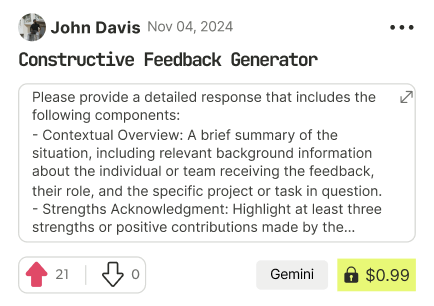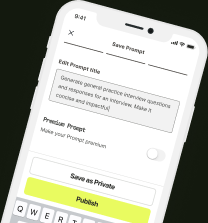prompt mine App
Find, Create & Share AI Magic
Ethical Persuasion Strategies
# Persuasion Strategy: Encouraging a Roommate to Clean Up Responsibly
### Analysis:
You need to persuade your roommate to consistently maintain cleanliness in shared spaces without harming the friendship. The current dynamic suggests friendship and mutual comfort, but your roommate’s negligence could lead to frustration and resentment. Likely resistance points include feeling criticized, defensive reactions, or diminished autonomy. Ethical considerations revolve around respectful communication, preserving mutual dignity, and maintaining friendship trust. Your desired outcome is sustainable behavioral change without relational tension.
### Strategy:
**Step 1 - Rapport & Commonality:** Initiate the conversation from shared understanding and appreciation, reducing defensiveness.
**Step 2 - Empathetic Framing:** Frame the conversation around shared household comfort and mutual respect rather than blame.
**Step 3 - Mutual Benefit Alignment:** Highlight positive outcomes for both—such as reduced stress, improved environment, and stronger friendship.
**Step 4 - Actionable Requests:** Offer specific, manageable behavioral suggestions rather than general criticism.
**Step 5 - Collaborative Agreement:** Conclude with agreement or compromise, creating a shared plan or guideline for cleanliness.
### Key_Language:
- **Opening Rapport-Building Phrase:**
"Hey, can we chat real quick? I've really appreciated living with you—our friendship means a lot to me."
- **Empathetic Framing & Mutual Understanding:**
"I know life gets busy and cleaning isn't always the first priority—totally understandable. But lately, I've felt a bit stressed seeing clutter in our common areas."
- **Mutual Benefit and Shared Goals:**
"If we could find a way to keep things tidier, I think we'd both feel more relaxed coming home. How does that sound to you?"
- **Question to Lead Thinking:**
"What do you think we could do together to make keeping things tidy easy and stress-free for both of us?"
- **Specific Action Request (non-accusatory):**
"Maybe we can agree to spend a few minutes every evening tidying up common spaces? What’s your thought on trying this out?"
- **Closing with Collaboration:**
"Awesome, let's give this a try together and check in after a week or two to see how it's working."
### Contingencies:
- **If roommate becomes defensive:** Immediately acknowledge their feelings ("I completely understand why this might feel uncomfortable.") then shift towards collaborative solutions again ("What would feel more manageable or fair for you?").
- **If roommate promises but doesn't follow through:** Use gentle accountability reminders focused on mutual impact ("I've noticed we've both been struggling a bit again—how can we adjust this to make it simpler?").
- **If roommate resists strongly:** Seek incremental progress rather than perfection ("How about we just pick one thing—like dishes or taking out the trash—that we both commit to consistently, and then go from there?").
### Ethical Considerations:
- Preserve roommate’s sense of autonomy by offering choices and collaborative solutions, not commands.
- Use "I" statements ("I feel stressed") rather than "you" statements that assign blame.
- Always maintain respect and empathy, recognizing that changing habits takes time.
- Prioritize sustaining friendship and dignity above immediate results or total agreement.

Find Powerful AI Prompts
Discover, create, and customize prompts with different models, from ChatGPT to Gemini in seconds

Simple Yet Powerful
Start with an idea and use expert prompts to bring your vision to life!

